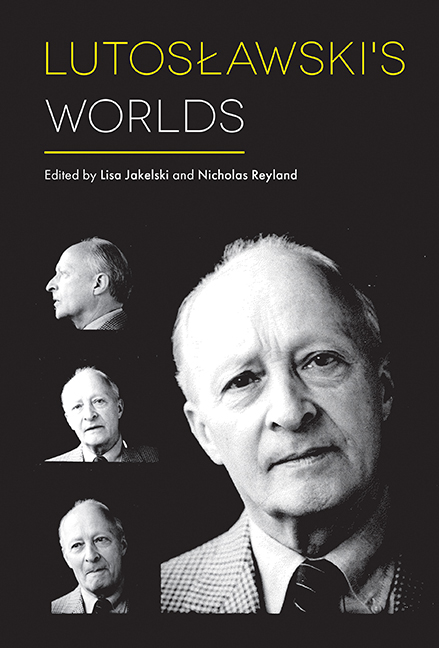Book contents
- Frontmatter
- Dedication
- Contents
- List of Figures
- List of Tables
- List of Music Examples
- List of Contributors
- Acknowledgements
- Introduction
- PART I mourning, modernism, and genius
- PART II other lutoslawskis
- 4 Behind the Curtain of Oblivion: Lutoslawski's Music for Theatre and Radio Plays
- 5 Derwid as Lutoslawski's Patron
- 6 Witold Lutoslawski in Occupied Warsaw
- 7 Lutoslawski and Sonoristics
- PART III documents
- PART IV political engagement
- PART V legacies
- Bibliography
- Index
4 - Behind the Curtain of Oblivion: Lutoslawski's Music for Theatre and Radio Plays
from PART II - other lutoslawskis
Published online by Cambridge University Press: 14 June 2019
- Frontmatter
- Dedication
- Contents
- List of Figures
- List of Tables
- List of Music Examples
- List of Contributors
- Acknowledgements
- Introduction
- PART I mourning, modernism, and genius
- PART II other lutoslawskis
- 4 Behind the Curtain of Oblivion: Lutoslawski's Music for Theatre and Radio Plays
- 5 Derwid as Lutoslawski's Patron
- 6 Witold Lutoslawski in Occupied Warsaw
- 7 Lutoslawski and Sonoristics
- PART III documents
- PART IV political engagement
- PART V legacies
- Bibliography
- Index
Summary
If we browse the biographies of twentieth-century Polish composers, we frequently find that they wrote music for theatrical performances and radio plays. The situation is similar with Witold Lutosławski, who spent several years composing musical illustrations for theatre and radio. However, researchers have not yet discussed this aspect of his creative work in detail. The present essay is intended as a small step toward changing this state of affairs. First, it will examine the social and cultural aspects of Poland's post-war theatre life, describing selected theatrical repertoire featuring Lutosławski's music. Next, the essay will discuss Lutosławski's position at Polish Radio. It will describe the composer's radio plays, explain their current state of preservation and present some theoretical considerations regarding the music Lutosławski created for these kinds of works. Finally, it will investigate the composer's approaches and solutions in selected passages from his works for radio.
In the period that interests us – the middle of the 1940s to the end of the 1950s, when Lutosławski completed the majority of his collaborations with theatres and Polish Radio – a play's music was, as a rule, subservient within the artistic work as a whole. Cues often played the role of a quasi-technical element, ensuring the necessary flow, which made the creators relegate the aesthetic quality of the music to a secondary position. Collaborating with theatres and Polish Radio certainly had a practical benefit for composers: it provided them with an opportunity to earn money that was quite useful, considering that remuneration for their more autonomous creations was frequently modest or entirely absent. Although Lutosławski spoke reluctantly about his ‘functional’ works in his later years, it is nevertheless worth turning some attention to these pieces for at least two reasons. First, the variety and originality of these musical settings testify to the scale of Lutosławski's compositional imagination. Second, these scores, like his film music, constitute a source of knowledge about his early compositional technique and, more specifically, his approach to composing for the theatre and radio.
Theatre Plays
Lutosławski wrote musical settings for theatrical plays over a dozen years, producing fifteen original scores between 1948 and 1960. The scores have survived in manuscript form and are presently kept in several centres.
- Type
- Chapter
- Information
- Lutoslawski's Worlds , pp. 89 - 118Publisher: Boydell & BrewerPrint publication year: 2018



